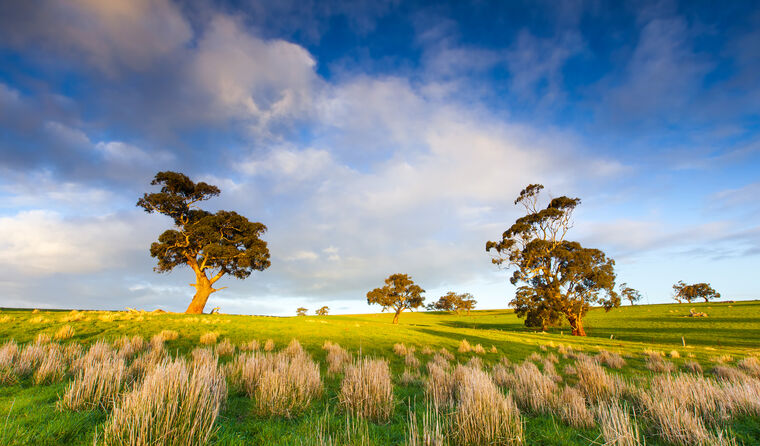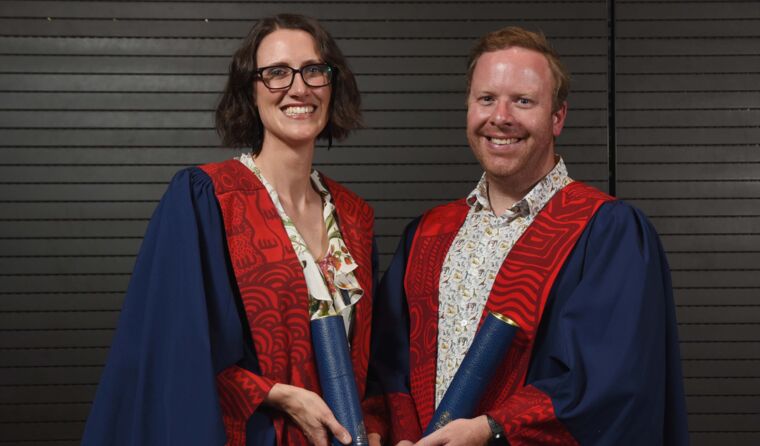Feature
‘So many wonderful things’: Why this GP couple went rural
Drs Gerard and Melanie Considine were among the first new Rural Generalist Fellows. They tell newsGP what draws them to their work.
 The clinical challenges and the appeal of rural living took Drs Mel and Gerry Considine to Clare in South Australia. Photo credit: Rebecca Sommerville.
The clinical challenges and the appeal of rural living took Drs Mel and Gerry Considine to Clare in South Australia. Photo credit: Rebecca Sommerville.
Dr Melanie (Mel) Considine always had her heart set on general practice.
Despite no medical background – her father is a mechanic turned bus driver, while her mother is a bank teller turned social worker – Mel was inspired by visits to the family doctor in rural South Australia.
‘I was always so impressed,’ Mel told newsGP. ‘I thought that it’d be pretty cool being able to answer all these questions and manage anything that came through the door.’
She recalls her local GP in Naracoorte doing anaesthetics, obstetrics and skin cancer surgery, and felt herself drawn to a profession combining science and working with people.
Almost apologetically, she explains her drive as ‘the classic line: I want to help people’ and says she signed up to a medical degree with a general practice career firmly in her sights.
In a striking coincidence, both Mel and her husband Dr Gerard (Gerry) Considine received their Rural Generalism Fellowships in November in the first ceremony since the RACGP introduced the pathway.
For Gerry, the journey to that moment was more roundabout.
Brought up in suburban Croydon in outer-eastern Melbourne, he describes his mother’s side of the family as ‘littered with academia and doctors’. It was his grandfather, an ear, nose and throat surgeon in Melbourne, who inspired him to move in a similar, clinical direction.
‘He was just a lovely fella, he really enjoyed helping people,’ Gerry told newsGP. ‘He told stories about different patients that he saw and just that humanity, I really enjoyed.’
Branching out from a lab-based biomedical degree, he realised he preferred working directly with patients, and thought a career in paediatrics beckoned.
However, his defining moments came on placements while studying medicine at Adelaide’s Flinders University, where he was first exposed to rural general practice. He recalls spending time in the small rural community of Quorn in the north of the state when local hospital closures were threatened.
‘I saw that passion that people had for their local hospital, nurses and doctors,’ he said.
‘It was an amazing experience to be there and be part of, to see how highly regarded health services are in those areas.’
On his final placement, he went to Jamestown, another rural South Australian town – not quite as remote, but still a place that proved formative.
‘It was there that the GP I worked with really impressed upon me that I could do the full breadth of medicine as a rural GP,’ Gerry said.
‘It was when I was getting exposed to those placements [that] I thought “no, actually, rural GP is where I want to be”.’

The Clare Valley region in South Australia.
Drs Mel and Gerry, who met as GPs in training, both work in the winegrowing region of Clare in South Australia, where they have lived for much of the past decade and are now raising their three young sons.
While Mel has fulfilled her childhood ambition, her enthusiasm still burns strong.
‘There are so many wonderful things about rural medicine that I find it tricky to pinpoint,’ Mel said.
‘Ultimately, it is probably two things: it’s the variety, the breadth of the work, which just keeps it really interesting, and also the people.
‘You can become a real part of the community and also build these long-term relationships with families.’
Gerry has also embedded himself firmly into a place very different to his childhood home.
Now specialising in skin cancer medicine, he enjoys the conversations he has while carrying out procedures and says they can be opportunities to pick up on other clinical issues that would otherwise have gone unnoticed.
‘I learned a lot about farming and livestock and other different facets of community that I wouldn’t otherwise know,’ Gerry said.
‘People are often keen to open up a bit more, I guess, and it gives us some insight as well … you might get a hint there’s a bit of anxiety or depression or something happening.
‘It opens it up for a lot more things that you just can’t do in the city as a specialist.’

The two GPs attended the same Rural Generalist Fellowship ceremony last year.
However, neither Gerry nor Mel shies away from acknowledging the challenges of the job, with both mentioning the ever-present uncertainty.
‘On the other hand, the variety is really rewarding as well, so it’s kind of a blessing and a curse,’ Mel said.
'If you’re on call, and then you’re having to manage your little kids the next day or going to the hospital and working out childcare … the logistics of that can be a bit stressful at times.’
Gerry also highlights how the logistical challenges of clinical care differ in the country.
‘Often the medical decision about “can I look after this person in this town?” is pretty easy,’ he said.
‘But then if I can’t, how to actually get them down for the scan that they need, or get them admitted to the big city hospital when they’re full can be the challenge.’
He says in Clare there are often options for care.
‘This person might have appendicitis [but] I don’t have to organise to get them all the way down Adelaide,’ he said.
‘I can just call up the GP surgeon [who] works in our town and say, “Hey, I think this person might have appendicitis, can you organise for them to have it out tonight, and I’ll assist you”.’
Even with those challenges, Mel strongly recommends rural general practice to medical students – but she recognises the difficulties in making it work.
‘It’s so dependent on where people are in their lives, in their relationships, if they’ve started a family yet … or if their partner is medical or not or has a job that’s pretty tied to the city. That can be really tricky,’ she said.
‘I love the career and I’m passionate about it as you can tell.
‘But I would perhaps suggest to them that if they haven’t yet started a family – or if they’re not quite sure – that it might be helpful to do a few more stints in the hospital or to try and gain their anaesthetics or their obstetrics if they’re thinking they might like to do that, whilst they’re still in the hospital system.
‘Ultimately, it probably is easier doing it that way around, rather than say, [when] you’ve bought a house and your kids are in school.’
She believes some people might also be put off by a misguided view of ‘gung-ho’ expectations in rural general practice.
‘This is ultimately about community primary care with emergency medicine thrown in as well [as] your special skill, whether that’s obstetrics, or in my case, paediatrics and lactation,’ she said.
According to Mel, imposter syndrome is almost inevitable as a rural generalist, but she encourages those considering a career in the field not to be deterred.
‘I think that’s a good thing, because then you recognise what you don’t know and you go and brush up on that and make sure you’re safe and practising within your scope,’ she said.
Having worked in rural general practice for more than a decade, Gerry now cannot imagine a return to big city life.
‘I grew up in that, I lived and breathed [city life], went to gigs in the city of Melbourne, but I just couldn’t do it again,’ he said.
‘You really get used to only driving two or three minutes to work, with houses surrounded by gum trees.
‘I can visit mum and dad for about a week and then I’m done with Melbourne and I just need to get back to the country.’
But surely as two GPs living and working in the same small town, it must be a challenge to switch off after work?
‘We don’t mind talking shop because we’re passionate about the job that we do,’ Mel said.
‘Having that understanding of what it’s like to have a difficult day in the clinic or in the hospital, and be able to empathise with each other, it’s actually really nice.
‘And we still manage to talk about other things.
‘I don’t know, it just seems to work. We’re very lucky.’
Log in below to join the conversation.
rural general practice rural generalism
newsGP weekly poll
Health practitioners found guilty of sexual misconduct will soon have the finding permanently recorded on their public register record. Do you support this change?